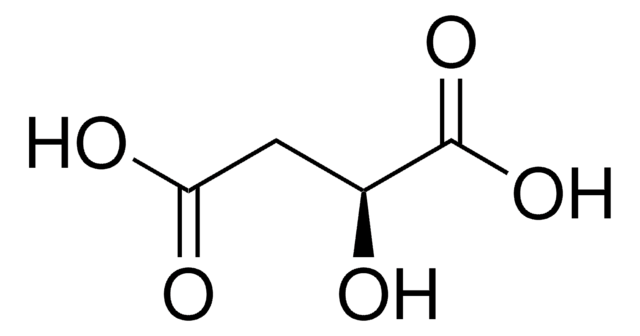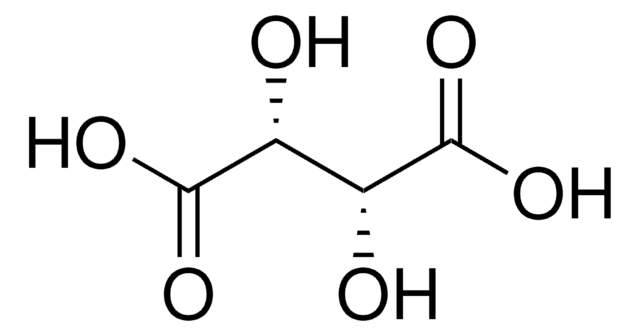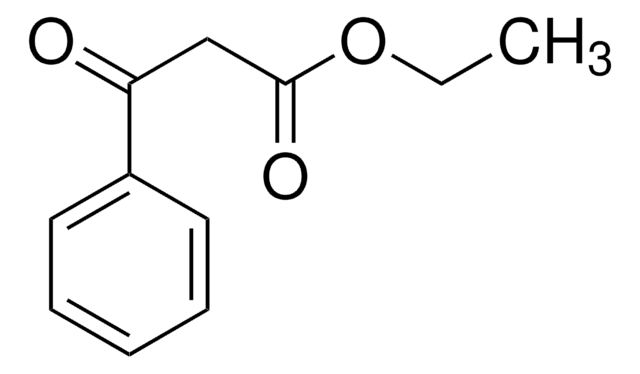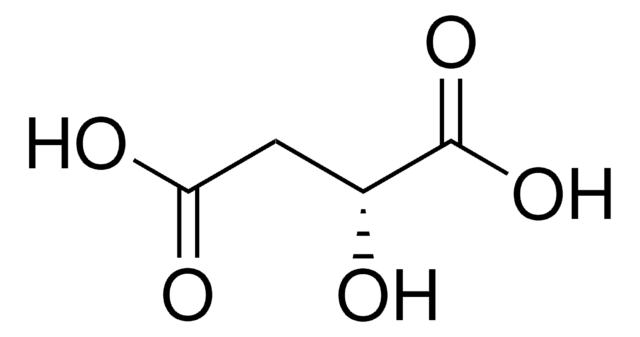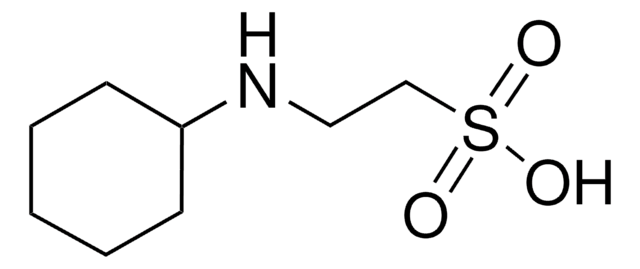M0875
DL-Malic acid
≥98% (capillary GC)
Synonym(s):
(±)-2-Hydroxysuccinic acid, DL-Hydroxybutanedioic acid
Sign Into View Organizational & Contract Pricing
All Photos(4)
About This Item
Linear Formula:
HO2CCH2CH(OH)CO2H
CAS Number:
Molecular Weight:
134.09
Beilstein:
1723539
EC Number:
MDL number:
UNSPSC Code:
12352100
PubChem Substance ID:
NACRES:
NA.22
Recommended Products
vapor density
4.6 (vs air)
Quality Level
vapor pressure
<0.1 mmHg ( 20 °C)
Assay
≥98% (capillary GC)
autoignition temp.
644 °F
mp
131-133 °C (lit.)
solubility
H2O: 50 mg/mL, clear, colorless to faintly yellow
SMILES string
OC(CC(O)=O)C(O)=O
InChI
1S/C4H6O5/c5-2(4(8)9)1-3(6)7/h2,5H,1H2,(H,6,7)(H,8,9)
InChI key
BJEPYKJPYRNKOW-UHFFFAOYSA-N
Looking for similar products? Visit Product Comparison Guide
Application
DL-Malic acid can be used as a reactant to synthesize:
- Hydroxy esters via esterification with alcohols.
- Biodegradable polymers via thermal condensation with citric acid.
Signal Word
Warning
Hazard Statements
Precautionary Statements
Hazard Classifications
Eye Irrit. 2
Storage Class Code
11 - Combustible Solids
WGK
WGK 1
Flash Point(F)
397.4 °F
Flash Point(C)
203 °C
Personal Protective Equipment
dust mask type N95 (US), Eyeshields, Gloves
Choose from one of the most recent versions:
Already Own This Product?
Find documentation for the products that you have recently purchased in the Document Library.
Customers Also Viewed
Phosphorus ylide based functionalizations of tetronic and tetramic acids
Schobert R, et al.
Synthesis, 2006, 3902-3914 (2006)
G Anneroth et al.
Scandinavian journal of dental research, 88(3), 214-218 (1980-06-01)
Two saliva stimulating drugs, solutions of Hybrin and malic acid were in an in vitro study found to have a heavy demineralizing effect on the root surface of the dental hard tissue. Consequently the drugs cannot be recommended to patients
Frédéric Bigey et al.
Current biology : CB, 31(4), 722-732 (2020-12-11)
Production of leavened bread dates to the second millennium BCE. Since then, the art of bread making has developed, yet the evolution of bread-associated microbial species remains largely unknown. Nowadays, leavened bread is made either by using a pure commercial
Cuiyue Liang et al.
Plant physiology, 161(3), 1347-1361 (2013-01-24)
Low pH, aluminum (Al) toxicity, and low phosphorus (P) often coexist and are heterogeneously distributed in acid soils. To date, the underlying mechanisms of crop adaptation to these multiple factors on acid soils remain poorly understood. In this study, we
Hugo Oliveira et al.
PloS one, 9(10), e108376-e108376 (2014-10-08)
Resistance rates are increasing among several problematic Gram-negative pathogens, a fact that has encouraged the development of new antimicrobial agents. This paper characterizes a Salmonella phage endolysin (Lys68) and demonstrates its potential antimicrobial effectiveness when combined with organic acids towards
Our team of scientists has experience in all areas of research including Life Science, Material Science, Chemical Synthesis, Chromatography, Analytical and many others.
Contact Technical Service
